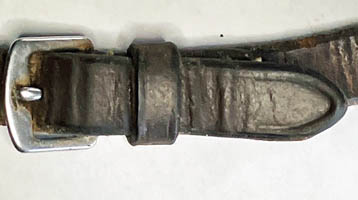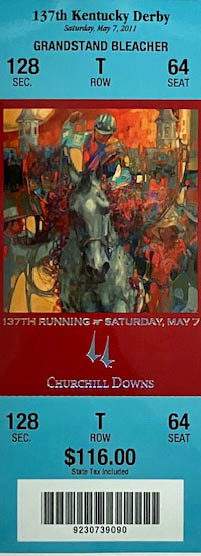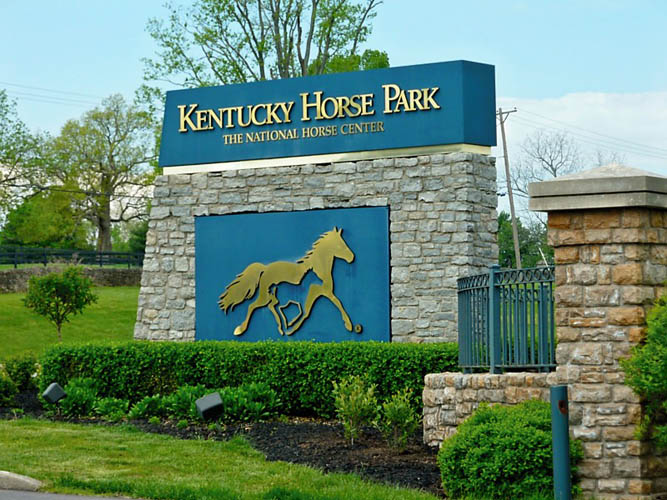So, You Think You Love Horses?
Some Reflections on the Nature of Horses and Man
Glossary of Equestrian Terms
Words Beginning with K
-
Keeper
keeper

|
[Equestrian Equipage] A keeper is a small loop of leather or other material built into tack to tuck a loose strap into. There are a number of them on a bridle, but they are also found on saddles where they hold the ends stirrup leathers and on full cheek snaffles.
-
Keg Shoe
[Equestrian Equipage] A keg shoe is a premade horseshoe rather than one fitted by a farrier by heating on a forge. The vast majority of shoes in use are keg shoes rather than those made by hot shoeing.
-
Kentucky Derby
[Horse Racing] The Kentucky Derby is an American Grade I stakes race run at Churchill Downs in Louisville, Kentucky. The race is run by three-year-old Thoroughbreds at a distance of 1 and a quarter miles. It is the most famous of American horse races and the part of racing's triple crown. Its winners are among the best known of horses by the general public. The other two races of the triple crown are the the Preakness Stakes in Maryland and the Belmont Stakes in New York. The Kentucky Derby was first run in 1875 and continues to be the oldest continuously held major sporting events in the U.S. and the oldest Thoroughbred stakes race held in the same location since its inception. For a long time Kentucky lagged behind states like New York as a racing center, but a concerted effort to develop its racing industry succeeded admirably. The name Derby was borrowed from a British race of the same name that dates from 1780 and is still run. The name is taken from the Earl of Derby, who was a sponsor of the original English race.
-
Kentucky Horse Park
[Equine Theme Park] Kentucky Horse Park is an educational theme park and an international equestrian competition venue in Lexington, Kentucky. It was opened in 1978 and for a person interested in horses it is like a visit to Disney. They have a twice daily Horses of the World Show, showcasing both common and rare horses from around the globe, the International Museum of the Horse and visitors have the ability to meet face to face various famous retired champion horses in small groups. They also have an intern program and host top competitions.
-
Kicking Chain
[Equine Equipage] A kicking chain is a light chain attached to a horses back legs to attempting to break the habit of kicking a stall wall.
-
Kimberwicke Bit
[Equine Equipage] A Kimberwicke is a bit with a solid mouthpiece and low port that allows the horse's tongue to pass under the bit, providing some relief to pressure on the tongue. In addition, it has a curb chain, which causes it to act as a leverage bit that requires only a single set of reins. It provides additional control for strong or "pulling" horses, not responding to a standard snaffle bit but is not as harsh as a Pelham bit.
-
Kiss
[Rider Vocalization] A kiss is a series of smooching-like sounds made by a rider to urge the horse into a canter.
-
Kissing Spines
[Veterinary Medicine ] The term "kissing spines" is the common name given to impingement of two or more vertebral dorsal spinous processes in the back. Spinous processes are the bony projections off the rear of a human's spinal column, which in a horse project upwards and slightly backwards and serve as an attachment point for muscles and ligaments. A horse might be asymptomatic, but more commonly has a sore back. That can result in back muscle tightness, bucking when ridden or discomfort on being mounted. Orthopedic surgery on the spinous process can be very effective and allow the horse to be comfortably ridden again. Humans can also rarely experience a similar problem.
-
Knee Roll
[Equine Equipage] A knee roll is a feature of a English jumping saddle that provides a "nesting spot," supporting the rider's knees. When needed you can clamp your knees against the knee rolls and have an extremely secure seat. Whether or not you do this is a matter of instant judgment. For example, a bucking horse is a lot more powerful than even the best rider's leg strength. It might be better to go into a two point stance, keep your balance and let the horse buck against air. I particularly like them coming out of an energetic jump when they keep you from flying forward and out of your seat.. They often attach with Velcro, allowing the rider to adjust their position or even remove them.
-
Kur
[Dressage and Vaulting] A kur is a routine consisting of a freestyle movements at the discretion of the rider (rather than prescribed) that is set to music. The horse moves in time to the music exhibiting the grace of its various dressage movements. The word kür is of German origin and indicates a courting. I suppose the rider is courting the judge and thus a freestyle. Provided that I enjoy the music, which is often classical, I find watching kurs very aesthetically pleasing. The 1963 film Miracle of the White Stallions depicts the director of the Spanish Riding School, Alois Podhajsky, performing what amounts to a kur for General George Patton.
Glossary of Equestrian Terms: Main Alphabetical Listing
Links to Other Sites with Equestrian Interests
Back to Introduction




